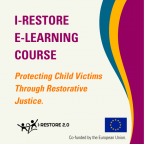i-RESTORE 2.0 project builds on the i-RESTORE project, which focused on promoting the use of restorative justice in cases involving child victims of crime and strengthening the capacities of justice professionals. Based on the results of that project, i-RESTORE 2.0 was drafted to go a step further and create accessible quality restorative justice processes for children in contact with the law. I-RESTORE includes an e-learning course to build and/or increase the capacities of different professionals working with child victims and/or child offenders in the criminal justice and in the child protection systems in terms of child-victim-friendly restorative justice approaches and mechanisms. The i-RESTORE e-learning course on Protecting Child Victims Through Restorative Justice is now available in Dutch, Estonian, Romanian, Greek, Albanian, English and Hungarian.
What is the purpose of the E-Module?
This E-Module is designed to build and/or increase the capacities of different professionals working with child victims and/or child offenders in the criminal justice and in the child protection systems in terms of child-victim-friendly restorative justice approaches and mechanisms. In practice, this e-learning will:
- raise awareness on restorative justice in cases involving children and young people, with additional attention for child victims;
- provide knowledge and tools to work in a more child-friendly way.
Who is the E-Module for?
This course is developed for:
- legal and criminal justice professionals (e.g. judges, lawyers, prosecutors, probation officers, police, prison staff)
- restorative justice practitioners (e.g. mediators, facilitators) and victim support workers
- child protection professionals (e.g. social workers, psychologists, child protection unit officers)
- professionals in education (e.g. teachers, school counsellors, educators, school management representatives, boarding schools and orphanages' representatives)
- representatives of NGOs working with children and/or restorative justice
- policymakers (e.g. representatives at the ministry of justice or education or social protection, national ombudsmen and ombudswomen)
- academics (e.g. researchers in children rights and/or restorative justice)
- students (e.g. law , psychology, sociology, social work, magistrates schools)

